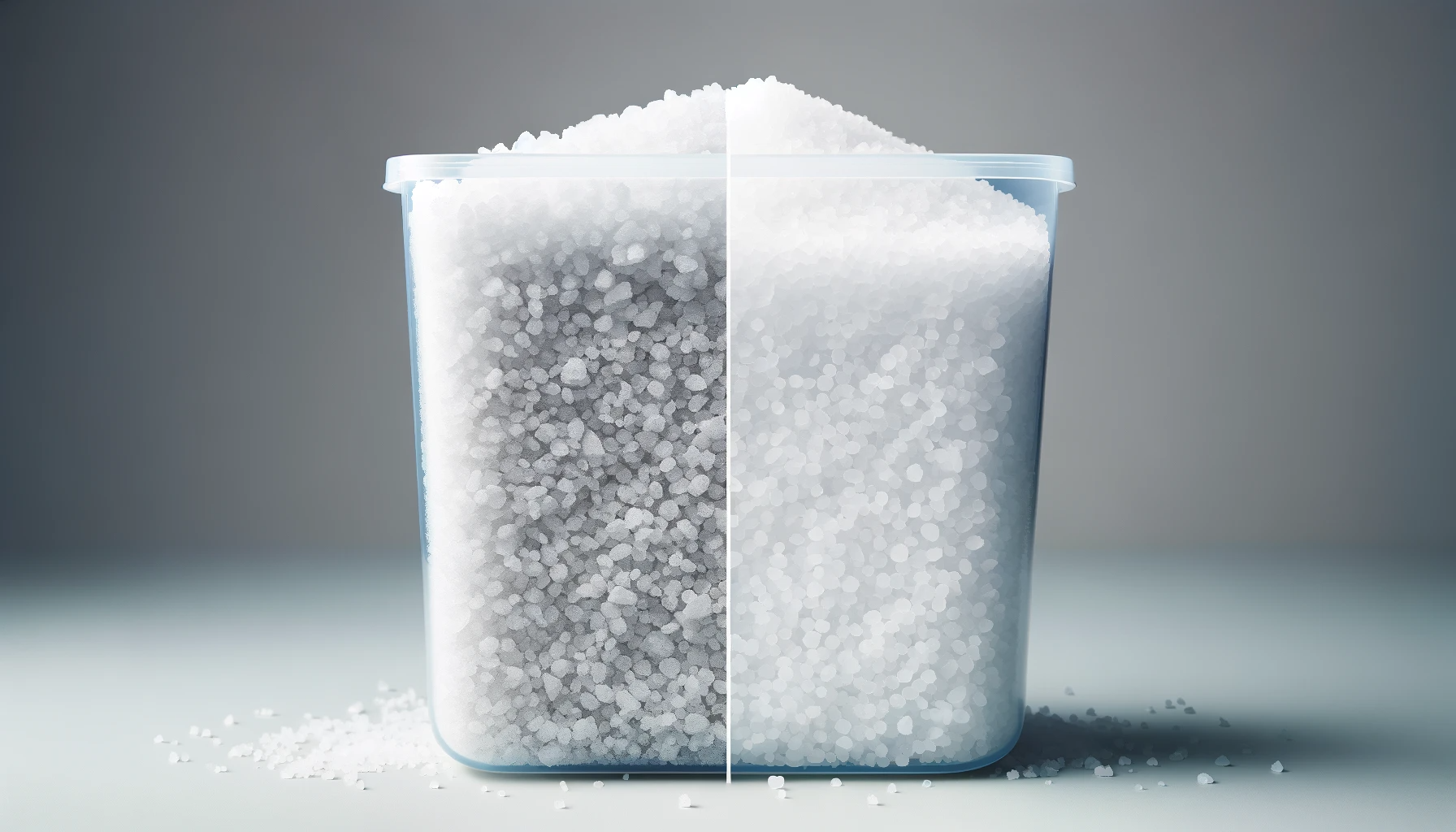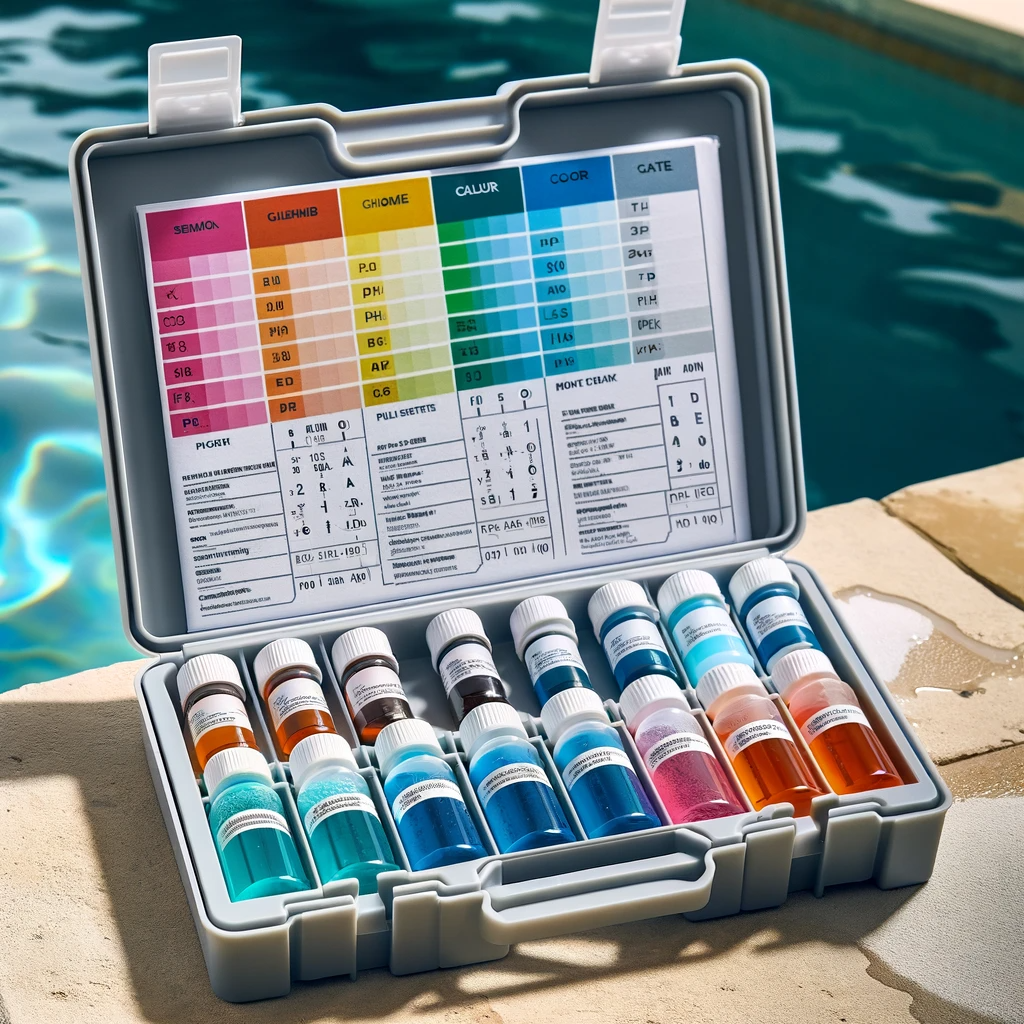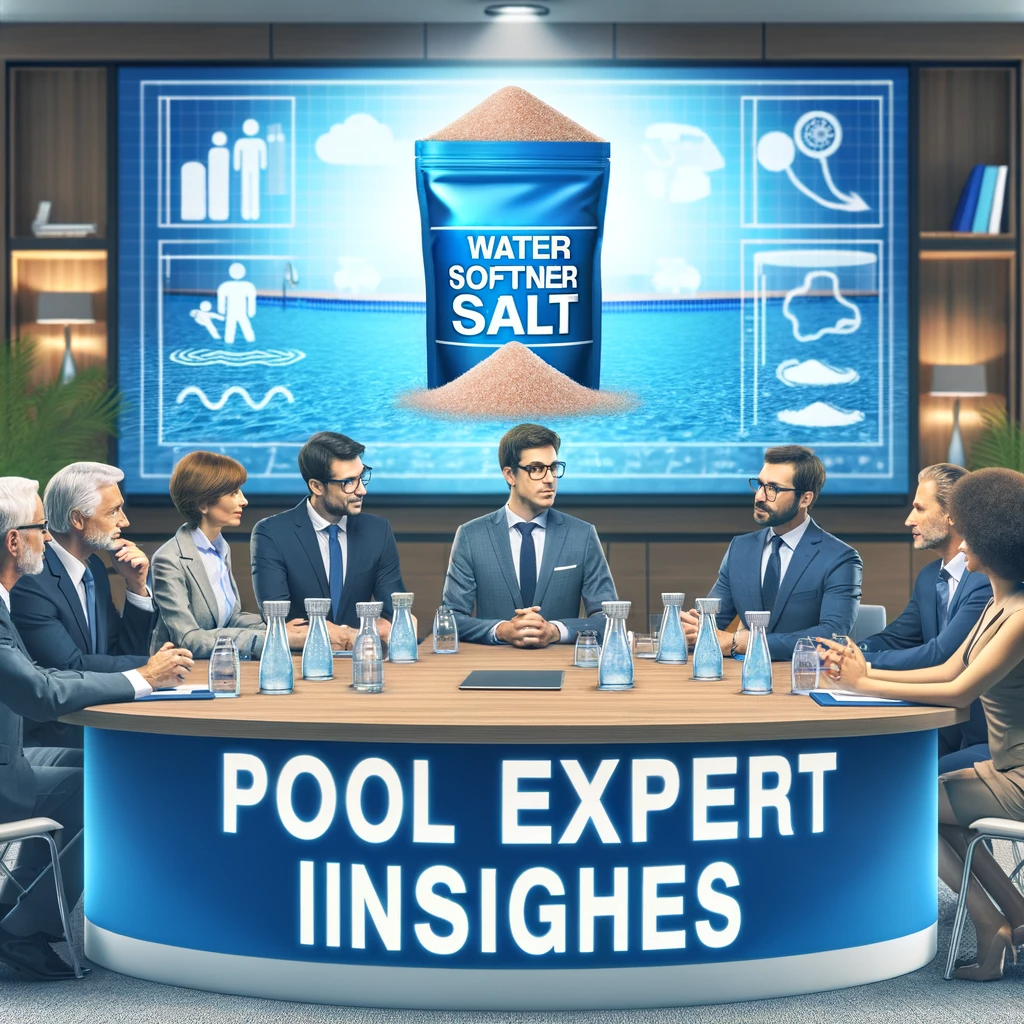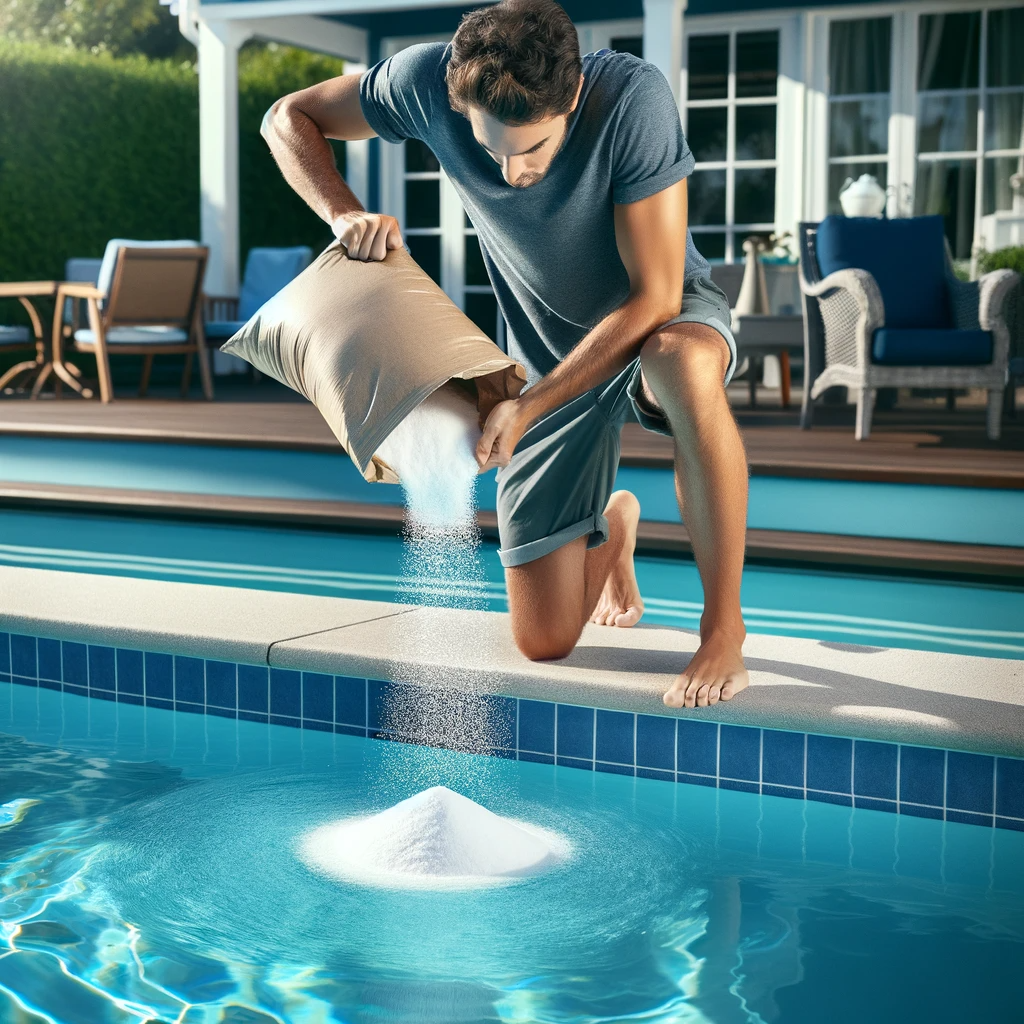Using water softener salt in your pool is not recommended as it can contain impurities. Pool-grade salt is designed for swimming pools and ensures proper chlorine generation and water balance.
Maintaining a pristine and healthy swimming pool requires the right kind of salt. Specifically, using water softener salt for a pool might seem like an economical shortcut, but it could lead to pool maintenance issues. Pool-grade salt is refined to contain fewer additives, which translates into fewer unwanted chemicals in your pool water.
This attention to purity helps to protect the integrity of your pool’s chlorine generator or salt system, ensuring that it functions efficiently. Conversely, water softener salt often contains anti-caking agents and other impurities that can clog filters, cloud water, or even damage pool components over time. For a safe, crystal-clear swimming experience, the slight extra investment in pool-grade salt is a wise decision, safeguarding both the condition of your pool and the quality of your swimming water.
Understanding Pool Salt And Water Softener Salt
Swimmers and homeowners often ask about the different salts for pools and water softeners. Understanding the function and composition of these salts is crucial. Pool water requires careful balancing. The right salt ensures a safe and clean swimming experience without damaging pool components.
What Water Softener Salt Is?
Water softener salt acts in home softening units. Minerals like calcium and magnesium are taken out of the water. Ion exchange, a process, makes the water softer for use at home. This keeps pipes and appliances from getting scale on them.

Comparison With Pool Salt
When it comes to pool salt and water softener salt, they are not identical. Pool salt is finer, allowing for quick dissolution in pool water. Water softener salt often consists of larger crystals and might contain additional elements that could affect pool chemistry.
| Aspect | Pool Salt | Water Softener Salt |
|---|---|---|
| Grain Size | Fine | Coarse |
| Dissolution | Quick | Slow |
| Purity Level | High | Variable |
| Usage | Pool Chlorinators | Water Softeners |
| Impurities | Fewer | More |
Type Of Salt
- Pool salt: Typically, sodium chloride or solar salt.
- Water softener salt: Rock, solar, or evaporated salt forms.
Each type serves a distinct purpose. Select the right one to maintain your pool’s health and your home’s water quality.

Sodium Chloride
Sodium chloride is common in both water softeners and pool salts. Yet, its purity and form influence its intended use. For pools, the sodium chloride must be clean and free of additives to avoid damaging the pool’s systems and to ensure safe water conditions for swimmers.
Benefits And Drawbacks Of Using Water Softener Salt In Pools
The use of water softener salt in pools sparks a lively debate among pool owners. Is it a savvy move for maintaining your pool water, or does it come with hidden drawbacks?
The Advantages Of Using Water Softener Salt In Pools
Integrating water softener salt into your pool maintenance routine can lead to several benefits:
- Cost-efficiency: Water softener salt is often more affordable than pool-specific products.
- Soft water feel: The salt can leave pool water feeling softer on the skin.
- Reduced chemical use: Utilizing salt can lessen reliance on chemicals like chlorine.
- Compatibility: Many pool systems are compatible with water softener salt, making it a versatile option.
Curious pool owners often ask, “Can I use Morton water softener salt in my pool?” Yes, as it’s a suitable alternative to pool-specific salts.
Potential Drawbacks
Yet, there are potential drawbacks to keep in mind before you dump the salt into your pool:
- Impurities: Some brands may contain impurities that could cloud pool water.
- Residue: Particular types of water softener salt might leave residue, affecting pool filters.
- Not all salts are equal: Certain water softener salts are not ideal for all pool systems.
- Need for frequent monitoring: Salt levels in pools require regular checks to prevent imbalances.

How To Properly Add Water Softener Salt To Your Pool
Integrating water softener salt into your pool can enhance the swimming experience. It’s gentle on the skin and can help maintain a clear pool. But it needs to be done correctly to be effective. The following steps are designed to help pool owners add water softener salt smoothly and efficiently.
Step-by-step Guide On Adding Water Softener Salt To A Pool
- Check Your Pool’s Salt Level: First, test the current salt level. This tells you how much salt to add.
- Purchase the Right Salt: Use pure, high-quality water softener salt. Avoid salt with anti-caking agents.
- Turn Off the Pool Filter: Before adding salt, ensure the filter system is off to prevent interference.
- Distribute the Salt Evenly: Spread the salt across the pool surface, starting from the shallow end.
- Brush the Pool: Use a pool brush to push undissolved salt towards the deeper part of the pool.
- Let the Salt Dissolve: Without the filter running, let the salt dissolve for about 24 hours.
- Turn On the Filter System: After 24 hours, restart the filter to circulate the saltwater.
- Recheck the Salt Level: Lastly, test the salt level again to confirm it’s within the ideal range.
Remember, proper distribution and brushing play crucial roles in this process. A pool and brush enhance the salt mixture in the water and prevent it from settling at the bottom of the pool.
The Importance Of Brushing The Pool
Brushing the pool is vital. It ensures even distribution and prevents salt from sticking to the pool floor. This not only guarantees a uniform saltwater mix but also protects your pool’s lining from potential damage caused by undissolved salt.
Expert Opinions And User Experiences
Diving into the pool of uncertainty, homeowners often ponder, “Can I use pool salt in my water softener?” Equally, the reverse query surfaces: the suitability of water softener salt in pools. Both questions are crucial for maintaining optimal water balance and equipment functionality.

Pool Expert Insights On Water Softener Salt Usage
Leading pool maintenance experts weigh in on this debate. They stress the importance of using the correct salt type. The composition of water softener salt varies. Different trace minerals and additives could harm pool equipment. Pool-grade salt, on the other hand, is more refined. This refinement ensures that the salt dissolves quickly and doesn’t cloud pool water.
“Using water softener salt in pools is a gamble with your equipment’s health,” notes a pool maintenance veteran.
Following proper guidelines is not just safe—it’s economical. Experts highlight that the savings from skimping on proper salt are minimal. Compared to potential damage costs, using pool-specific salt is wise.
User Experiences From Forums
-
On TroubleFreePool, members often caution against swapping salts. They share stories of cloudy water and clogged filters.
-
Reddit users echo this sentiment. “I learned the hard way that saving a few bucks wasn’t worth it,” shared one Redditor. They speak of the hassles following improper salt use.
These experiences on forums are telling. Real-life examples show the effects of deviating from recommended products. They highlight negative outcomes such as additional maintenance and increased expenses.
Thus, whether it’s keeping your pool sparkling or your water softener running smoothly, choosing the right salt is essential. While the question remains, “Can I use pool salt in my water softener?”, expert advice and user experiences guide homeowners towards the right choice.
Frequently Asked Questions On Can I Use Water Softener Salt In My Pool
Can Water Softening Salt Be Used In A Pool?
Yes, water softening salt can be used in a pool to manage water hardness and chlorine generation in saltwater systems. Always ensure it’s pure and suitable for pool use.
What Is The Difference Between Water Softener Salt And Pool Salt?
Water softener salt is formulated to dissolve minerals causing water hardness, while pool salt is specifically designed for chlorine generators in pools to maintain water cleanliness. Each type of salt is optimized for its intended purpose in water treatment systems.
What Is A Good Substitute For Pool Salt?
A suitable substitute for pool salt is solar salt or non-iodized table salt. Ensure it’s pure and lacks additives for water softening or anti-caking properties.
Conclusion
Summing up, utilizing water softener salt in your pool requires caution. Assess compatibility and consult a professional. Although cost-effective, risks remain. Ensure the salt is pure and free from additives. Your pool’s longevity and swimmers’ safety are paramount. Always prioritize informed decisions for blissful, crystal-clear waters.


Leave a Reply